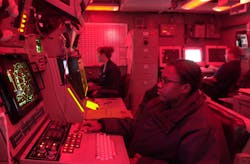Lockheed Martin to build electronic warfare (EW) systems to protect surface warships from anti-ship missiles
WASHINGTON – U.S. Navy surface warfare experts are ordering additional advanced shipboard electronic warfare (EW) systems for surface warships like aircraft carriers, amphibious assault ships, cruisers, and destroyers under terms of a $50.6 million order announced Monday.
Officials of the Naval Sea Systems Command in Washington are the Lockheed Martin Corp. Rotary and Mission Systems segment in Liverpool, N.Y., for full-rate production of AN/SLQ-32(V)6 Surface Electronic Warfare Improvement Program (SEWIP) Block 2 units.
SEWIP Block 2 is an evolutionary acquisition and incremental development program to upgrade the existing AN/SLQ-32(V) electronic warfare system.
SEWIP provides enhanced shipboard EW for early detection, analysis, threat warning, and protecting surface warships from anti-ship missiles. SEWIP Block 2 will enhance the shipboard EW system’s receiver and antenna group to meet the latest threats.
SEWIP Block 2 expands on the receiver and antenna group necessary to keep capabilities current with the pace of the threat and to yield improved systems integration, Navy officials say. Lockheed Martin won a $98.5 million order in March 2017 for full-rate production of AN/SLQ-32(V)6 SEWIP Block 2 subsystems.
The Lockheed Martin Block 2 SEWIP design for defense against anti-ship missiles is based on its integrated common electronics warfare system (ICEWS), which enables rapid reconfiguring of the system with commercial technology.
Mercury Systems in Andover, Mass., is providing advanced radio frequency microwave tuners and intermediate frequency products for SEWIP Block 2. Lockheed Martin chose the Mercury Echotek series microwave tuner and digital receiver, which are optimized for fast tuning and high performance.
On this order Lockheed Martin will do the work in Liverpool, N.Y.; and Lansdale, Pa., and should be finished by March 2024. For more information, visit Lockheed Martin online at www.lockheedmartin.com, or Naval Sea Systems Command at www.navsea.navy.mil.

John Keller | Editor-in-Chief
John Keller is the Editor-in-Chief, Military & Aerospace Electronics Magazine--provides extensive coverage and analysis of enabling electronics and optoelectronic technologies in military, space and commercial aviation applications. John has been a member of the Military & Aerospace Electronics staff since 1989 and chief editor since 1995.

